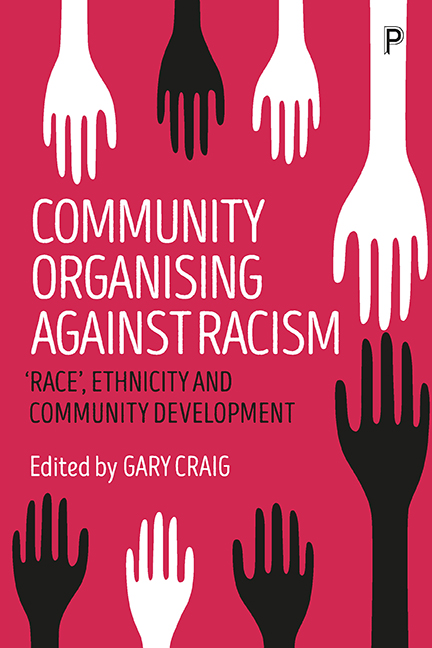Book contents
- Frontmatter
- Dedication
- Contents
- List of figures
- Author biographies
- List of abbreviations
- Introduction
- Section One Community development with ethnic minorities: history, theory, policy
- Section Two Building capacity with BME groups
- Section Three Working with Roma communities
- Section Four Global experience
- Section Five Working across cultural boundaries: ideological and personal reflections
- Afterword: Messages for community development in working with minority groups
- Index
Ten - Gypsy, Roma and Traveller women: how community work can both challenge and contribute to gender inequalities
Published online by Cambridge University Press: 12 April 2022
- Frontmatter
- Dedication
- Contents
- List of figures
- Author biographies
- List of abbreviations
- Introduction
- Section One Community development with ethnic minorities: history, theory, policy
- Section Two Building capacity with BME groups
- Section Three Working with Roma communities
- Section Four Global experience
- Section Five Working across cultural boundaries: ideological and personal reflections
- Afterword: Messages for community development in working with minority groups
- Index
Summary
This case study provides an insight into the experiences of applied community development work with Gypsy, Roma and Traveller (GRT) communities at a specific site in the East of England from 2010–16. It summarises a range of observations, reflections and questions gathered throughout this prolonged period of practice, with a view to informing the work of others working with GRT people, regarded as the most disadvantaged minority communities in the UK.
Situated on the margins of a large urban settlement and nestled between motorways, an industrial estate and sizeable swathes of unsightly marshland, lies a 27-pitch local authority caravan site. Practically unnoticeable to passers-by in their cars, trucks and lorries, it is home to families and individuals belonging to GRT communities in the region of East Anglia.
In parts of this region there has been a variable scattering of community work over the last 15–20 years, focusing on communities living within areas categorised as having multiple deprivations. Limited employment opportunities, above-average health inequalities and low educational attainment have led to a range of neighbourhoodlevel initiatives, framed by community development principles, all with the general aim of working with local people to address their priorities. Community development work featured as a key underlying component in various urban regeneration-focused initiatives instigated by the UK government from the late 1990s, representing a more general drive to address issues of inequality and social injustice faced by people living in these areas of multiple deprivation.
During 2009, new Neighbourhood Management initiatives were developed in East Anglia, in one of which the author was employed as a community development worker. These initiatives were built around a partnership of local community leaders, statutory services and voluntary and community sector (VCS) representatives, centred on small local communities – often no bigger than one or two electoral wards – and were embedded in community development principles. It was not unexpected that the newly established programme, driven by a mandate to coordinate service delivery to improve quality-of-life outcomes in the locality and, importantly, to ensure that delivery was informed by and, in turn, focused on people who needed support the most, would seek to engage with people from the GRT community.
- Type
- Chapter
- Information
- Community Organising against Racism'Race', Ethnicity and Community Development, pp. 171 - 184Publisher: Bristol University PressPrint publication year: 2017



